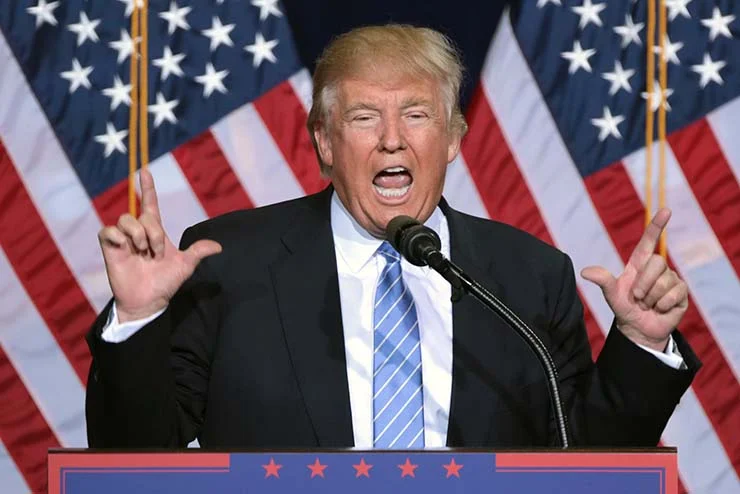Voting Day draws near and by all appearances this election will prove particularly consequential. Crime is up, our borders are overrun, and the economy is in trouble—all thanks to the ruinous policies enacted by the Biden-Harris administration. The vice president has attempted to distance herself from Biden’s governance. I don’t blame her. But when asked on The View to explain what she would have done differently, she responded that “not a thing comes to mind.”
America will surely suffer under another four years of Democratic governance. For this reason alone, a Trump victory is necessary. But there is another, perhaps more important angle to consider. If Trump loses, it will constitute a devastating blow not only for the former president, but for the issues he championed.
Donald Trump has been the leader of the American right for nearly a decade. Some appear to have forgotten what the GOP was like before the real estate magnate entered politics, whereas others are simply too young to remember.
Allow me to remind you. When Republican nominee Mitt Romney advocated for “self-deportation” during a 2012 debate with then-incumbent Obama, this was viewed as a radical proposal. Immigration hawks cheered Romney’s comments. Liberals were incensed. And Reince Priebus, who chaired the Republican National Committee (RNC), denounced those comments as “horrific.”
But at this year’s convention, the RNC handed out signs calling for mass deportations. Opposition to mass migration is now a mainstream issue, one supported by 55 percent of Americans. The Great Replacement, a theory once relegated to the fringes, is now openly discussed by popular pundits like Tucker Carlson.
You can thank Trump for all of that.
Trump’s right-wing critics—those who were disappointed with the former president’s first term in office—sometimes point out that immigration restriction existed before Trump, and that Trump therefore does not have a monopoly on the issue. They have a point.
But as the Romney anecdote illustrates, prior to Trump, immigration simply wasn’t in the foreground. Without Trump coming along to break the ice, people simply wouldn’t be talking about the issue as much.
Those who want less immigration are not the only ones to associate the issue with Trump. Liberals regularly bemoan Trump’s rhetoric about immigration and call it racist. “Trump’s constant demonization of Black people and immigrants,” wrote Thomas B. Edsall in a recent New York Times op-ed, “has inured the public to the fact that he is the first—or certainly the most explicit—modern president and party nominee to transparently generate, not to mention exacerbate, fear and white animosity toward people of color.”
If immigration hawks and liberals have both rightly concluded that Trump is an avatar of immigration restriction and opposition to woke racial ideology, then it isn’t a stretch to conclude that scheming Republican operatives—those who long to relegate Trumpism to the proverbial dustbin of history—have concluded the same.
These NeverTrumpers differ from Trump’s previously mentioned right-wing critics in that they do not oppose Trump because he doesn’t go far enough, but instead because he goes too far—in a direction they loathe. These displaced operatives want the Republican Party to be defined by things like tax cuts, hawkish foreign policy, and milquetoast social conservatism. They hate the fact that Trump has reoriented the GOP toward civilizational politics.
A Trump loss would be a blessing for those, both left and right, who abhor the direction Trump has steered the party. The GOP’s narrative going forward would go something like this: We tried the whole Trumpism thing, and while it briefly succeeded in 2016, it has failed every time since. The liberal media will be quick to boost this narrative. Don’t believe me? They’ve been doing it for years.
If Trump loses in November, any Trumpian candidate going forward would face considerable obstacles. There would be pressure from the GOP, some sectors of conservative media, and a swathe of the donor class to dispense with the Trump playbook. It’s also worth considering how many (if any) Trumpian candidates there might be. While the base loves Trump and what he embodies, Republican politicians are likely to be less staunchly committed to this new direction without him around. Those predicting that a Trump loss would pave the way for an even more based and red-pilled politician are not only wrong—they have it completely backwards.
Nevertheless, it is worth pondering who would even succeed Trump following a 2024 loss. Nikki Haley? Chris Christie? This year’s Republican primary was far from impressive. While I believe that DeSantis would make a reasonably good president, it is unclear whether his ill-fated 2024 campaign doomed his prospects. As far as I’m concerned, the only promising Trump successor is already by his side: J. D. Vance. And what better way to pass the torch than to give it to a man with four years of vice-presidential experience under his belt?
When you realize that the 2024 election is not just about the next four years of our country, but about the very future of the American right, it becomes clear that there is only one choice. Trump may not be perfect, but all who mean to be serious on the right owes him their votes.

Leave a Reply